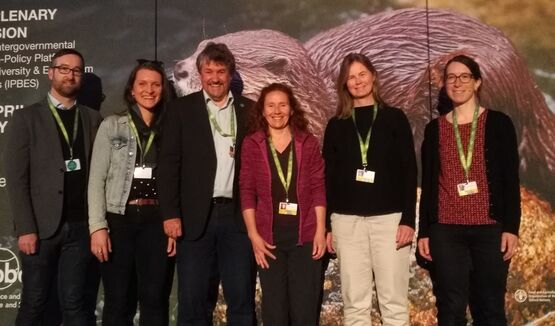
Intergovernmental Platform on Biodiversity and Ecosystem Services" (IPBES)
The Intergovernmental Platform on Biodiversity and Ecosystem Services (IPBES) is an intergovernmental body that is meant to provide a better informed basis for decision making in environmental policies. The basic idea is that decision makers can put forward important topics to IPBES and IPBES tries to assess the best available knowledge on this specific topic and to provide options for actions including their consequences.
The formal founding of IPBES took place in Panama in 2012 and since the second plenary of the more than 130 member states in Antalya in December 2013 IPBES has a first work programme for the period of 2014-2019. This work programme is composed of several activities in the working areas of capaicty building, knowledge generation, policy tools and assessments and the respective expert groups and task forces have been established. Members for such groups were nominated by member states and other organizations and chosen by the Bureau and the Multidisciplinary Expert Panel (MEP). The work of the scientists involved is on a voluntary basis only, as are the financial contributions of the member states.
Assessments in the work programme were:
- Assessment on pollinators, pollination and food production (adopted in 2016 at IPBES 4)
- Assessment of scenarios and models of biodiversity and ecosystem services (adopted in 2016 at IPBES 4)
- Four regional assessments (Africa, Asia-Pacific, Americas, Europe and Central Asia) on biodiversity and ecosystem services (adopted in 2018 at IPBES 6)
- Global assessment on land degradation and restoration (adopted in 2018 at IPBES 6)
- Global assessment on biodiversity and ecosystem services, based on the regional assessments (adopted in 2019 at IPBES 6)
- Global assessment on invasive alien species (ongoing, adoption planned for 2023)
- Global assessment on sustainable use of wild species (ongoing, adoption planned for 2022)
- Global assessment on conceptualization of values (ongoing, adoption planned for 2022)
At IPBES 7 (2019 in Paris) a second work programme was startet which forsees in a first round the following assessments:
- Nexus biodiversität, food, water and health (planned to be finished in 2025)
- Determinants of transformative change (planned to be finished in 2024)
- Business and biodiversity (planned to be finished in 2025)
- Climate change and biodiversity (planned to be finished in 2022)
The task forces for the other functions of IPBES keep going on. The IPBES secretariat (located in Bonn) presents the IPBES products and informs on it's homepage on current developments and all decisions taken by the plenary.

The long way to IPBES
A long way to IPBES The way from the first calling for a global science-policy interface for biodiversity (in the Millenium Ecosystem Assessement 2001) to really founding the Intergovernmental Science-Policy Platform on Biodiversity and Ecosystem Services seems as long as the title of that global body itself: it took more than ten years of planning before it was established. A major step was the proposal by UNEP to create "IPBES" similarly to the International Panel on Climate Change (IPCC). The two letter E and S for ecosystem services were added only at the end of the discussion when the idea got more and more accepted that ecosystems provide services for human wellbeing and that these services are threatened and not endlessly available. It became also more obvious that such services have an economic value as well. The ninth Conference of the Parties to the CBD (COP 9 in Mai 2008) officially welcomed the UNEP proposal and the efforts for a first multistakeholder meeting for concrete negotiations for forming IPBES. A gap analysis performed by UNEP claimed in 2009 that there are many different interfaces between biodiversity research and policy worldwide but that they act on very different scales (from regional to global), don't work on a regular basis and in their majority are not permanently funded. The study therefore concluded that none of the existing mechanisms fulfills the requirements of a global body and recommended the funding of a new global instrument. The United Nations General Assembly in December 2010 decided to formally found an intergovernmental body called IPBES. UNEP was requested in February 2011 to facilitate a first plenary meeting in the same year to which all UN member states and stakeholders were invited to participate. This meeting took place in Nairobi and the negotiations were so complicated and heavy that a second meeting had to be scheduled for April 2012 in Panama to finally found IPBES. About 90 states signed the founding resolution and took a first important decision: the international secretariat was given to Bonn. It took four rounds of voting before Germany won against the Republic of Korea by 47 to 43 votes. In the earlier rounds the present states had voted out India, France and Kenya. After founding, the first plenary of the meanwhile more than 100 member states took place in Bonn in January 2013 (IPBES 1). Next to many rules of procedure the IPBES Bureau was elected as well as the major scientific body of IPBES, the Multidisciplinary Expert Panel (MEP). The MEP was elected for an interim period of two years. Chairmanship was agreed to rotate every three years to another UN region and the first elected chair was Prof. Zakri Abdul Hamid (Malaysia), followed by Prof. Robert Watson (United Kingdom), and since IPBES 7 (2019 in Paris) Ana Maria Hernandez from Colombia is chair of IPBES. The MEP gets also elected every three years.